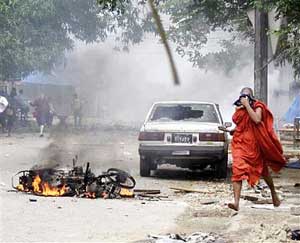
|
|
|
Home Asia Pacific South East Asia Myanmar Myanmar Protest News Burma's Junta: Too Late to Turn Back the ClockBy Cynthia Boaz, t r u t h o u t | Perspective, October 16, 2007New York, USA -- At the time of this writing, pro-democracy groups from Burma estimate the number of Buddhist monks killed by regime violence in the past two weeks to be as low as 200 and possibly many more. Those numbers make the regime's official estimates of a dozen or so monks killed absurdly low, and they highlight a serious error in strategy by the junta - one that is likely to be their final undoing.
By sequestering the monks away and focusing the most recent rounds of open violence on student leadership, the generals assume they are killing two birds with one stone - both quashing dissent (including amongst the monks themselves) and giving the appearance of stability rather than blatant cruelty. But they are failing on both counts.
A common regime tactic in striking out against a nonviolent mass movement considered threatening to their power is to accuse the group of being "terrorists" or "enemies of the people." But in this case, the generals are in quite a dilemma because they know no one will believe that sort of fiction about peaceful, much-beloved monks. So, their answer is to hide away the monks and continue to terrorize the people. However, yesterday's arrests (and reported torture) of three suspected movement leaders, including one of the alleged 8888 generation leaders, is evidence not of control by the regime, but a lack of it, especially because the movement has committed itself to the use of nonviolent methods in its resistance. Although those arrests came as a heartbreaking blow, they were not entirely unanticipated by the movement, which means they were probably accounted for strategically. According to reports from pro-democracy groups inside the country, there are too many layers of leadership for the regime to attack simultaneously. The mass movement in Burma is unlikely to be defeated by removing its most visible components because they have organized themselves around a conceptualization of power that does not depend on the guidance of just a small group of people. The resistance is based on the notion of people-power, a genuinely bottom-up form of authority that finds its strength in numbers and scope, not in the charisma or strategy of one or two key individuals. So, the more the regime attacks, the more likely it is that movement's numbers will actually increase. In fact, on Thursday, the Industrial Zone Workers' Union made a public declaration of their solidarity with the movement, and declared its members would join in "when a general strike comes up." They also "exhort all workers of Burma to work for our country's cause." In making that fatal error to use violence against the soul of Burma, the regime has very likely sealed their fate. To paraphrase Lech Walesa, former leader of the Solidarity trade union federation, which ultimately undermined Communist Party power in Poland, it was at that moment - with the decision to respond so violently to nonviolence - when the regime revealed they were losing the conflict. As in the Polish and other even more repressive country examples of the past half century, the Burmese junta can (and likely will) try to drag out the inevitable for several more months or even years, but in doing so, they will only continue to reinforce people's will to resist them, as well as the growing international pressure on them. So, it is not only the misery of the people of Burma the regime and its security forces are prolonging, but ultimately their own as well. (The events within Burma described above come from a member of the exiled pro-democracy leadership of Burma 8888. This individual is now deeply involved in the current movement's strategizing and communications, and is in regular contact both with groups on the Thai-Burma border and within the country. Because of the sensitive nature of his work, he has asked to remain anonymous.) -------- |
 Get your Korean Buddhist News here, brought to you by BTN-Buddhist Channel |
 |
 The Mandala app brings together Buddhist wisdom and meditation techniques with the latest insights of psychology and neuroscience to handle the challenges and complexities of modern life. The App offers a series of engaging talks and conversations with experts on a wide variety of topics, such as managing stress, dealing with adversity, developing greater resilience, cultivating empathy and compassion, creating healthy relationships, and many more. These topics are explored to help find greater peace, meaning and joy in our lives. Our panel of experts include Dr, Thupten Jinpa, Daniel Goleman, Kelly McGonigal and others.FREE DOWNLOAD here |
| Point
your feed reader to this location |
| Submit an Article |
| Write to the Editor |

 Although the regime wants news of their ongoing and brutal repression to spread far and wide within the country (so as to terrorize its citizens out of continuing to protest), they are simultaneously attempting to cover up the extent of the repression against the monks themselves.
Although the regime wants news of their ongoing and brutal repression to spread far and wide within the country (so as to terrorize its citizens out of continuing to protest), they are simultaneously attempting to cover up the extent of the repression against the monks themselves. 